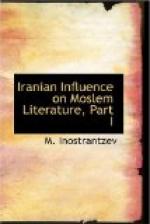Besides this place in the Fihrist, Umar ibn Farrukhan of Tabaristan has been mentioned in two other places. Once briefly,[1] (268, 25-26) as the annotator of the astronomical book of Dorotheya Sidonia and in another place (277, 14-18) in a few lines[2] specially devoted to him. Here he is mentioned as the annotator of Ptolemy as translated by Batrik Yahuya ibn al Batrik and as the author of two books, one of astronomical contents and the other entitled Kitab al Mahasin, that is the book of good qualities and manners.[3] This latter book demands a few lines from us.
[Footnote 1: Ibn al Qifti 184, 9—10.]
[Footnote 2: Ibn al Kifti 241, 20-242, 12. (This has been pointed out in the Fihrist Vol. II, 110-111, and in ZDMG XXV, 1871, 413—415.) Further mention of him in the same book 98, 9 and 184, 10.]
[Footnote 3: An account of the literary activity of this author was given in the work of H. Suter, Die Mathematiker und Astronomen der Araber und ihre Werke, Abhandiungen Zur Geschichte der mathematischer Wissenschaften Supplement zum, 45 Jahrgang der Zeitschrift fur Mathematik und Physik, Leipzig, 1900, 7-8. Haji Khalfa cites only the astrological books of Omar Ibn Farrukhan I, 198 and V, 35, 386. See also Justi Namenbuch 95, Nos. 15 and 19.]
Umar ibn Farrukhan is mentioned in the section of books on astronomy, mathematics, physics, mechanics, and music. In this group are mentioned a number of writers who composed works on these sciences, beginning with Euclid and ending with the contemporary authors of an-Nadhin. In the midst of them, an-Nadhin has also mentioned the grandsons of Naubakht. Not one of them wrote any Kitab al Mahasin which appears, therefore, to be the independent work of Umar ibn Farrukhan. This book, further, could not have been of a scientific astronomical, or mathematical nature as is obvious from its subject-matter which related to good manners and conduct. This book has been mentioned in this group only because here are enumerated the works of Umar ibn Farrukhan. And good manners and conduct constituted, as we saw above, a favourite theme of Parsi literature: wherefor the book heads the list. Similar to it are the contents not only of Andarzes and Pand Namehs but of a series of tracts on religious subjects. Hence we think that it was mainly owing to this book that Umar ibn Farrukhan was included among the number of principal translators from Persian into Arabic and came to be enumerated among the translators to whom is ascribed a certain amount of speciality. For he was the solitary representative of his category of translators of ethicodidactic books intimately connected with the problems of the Paris religion. Possibly Umar ibn Farrukhan was the first to introduce this species of literature into Arabic, and we must add, employed for his material as well as ideas Parsi tracts. Originally from Tabaristan, he, in the words of Ibn al Qifti, was introduced to Abu Maashar




